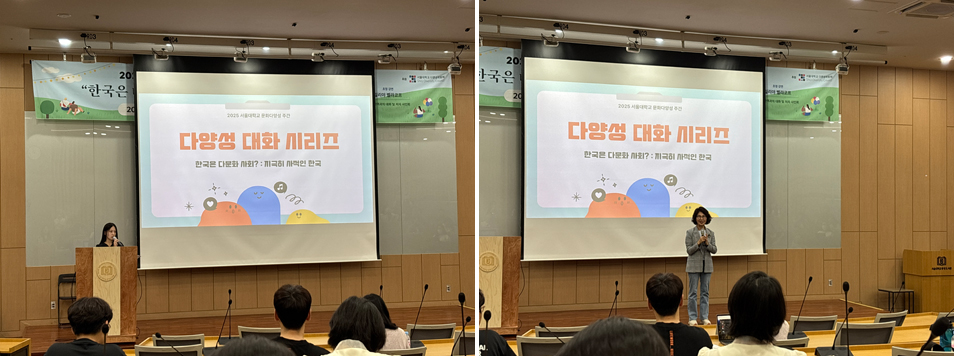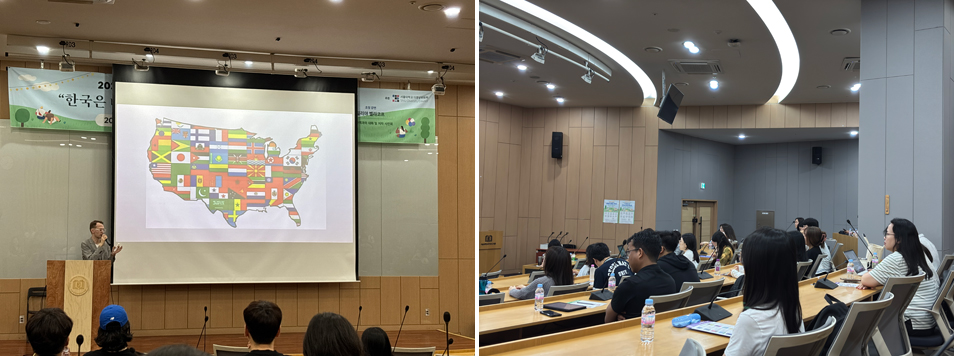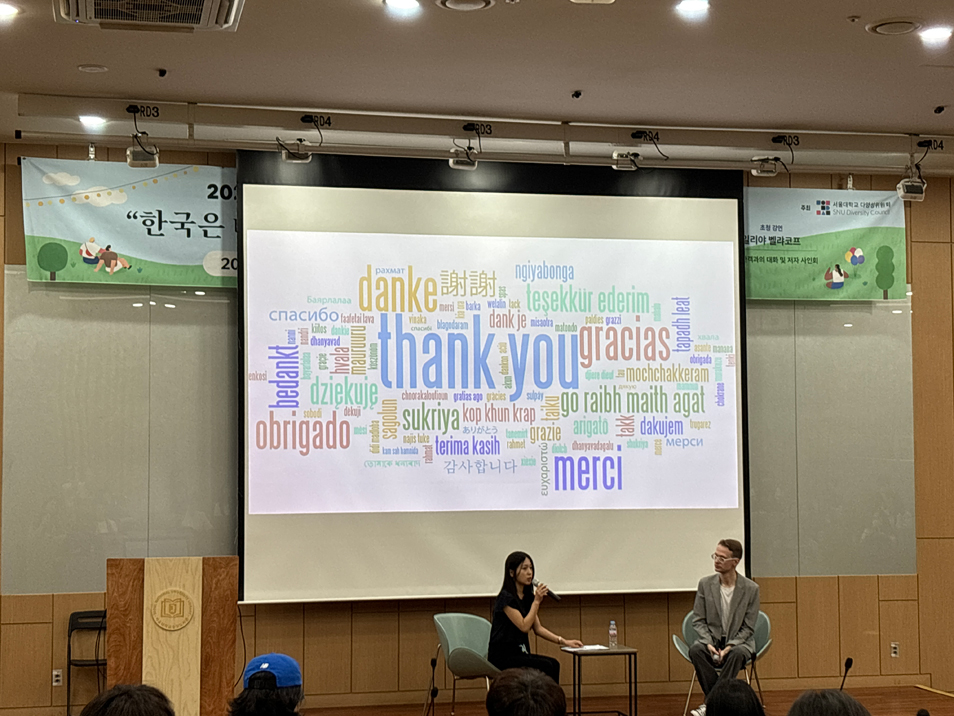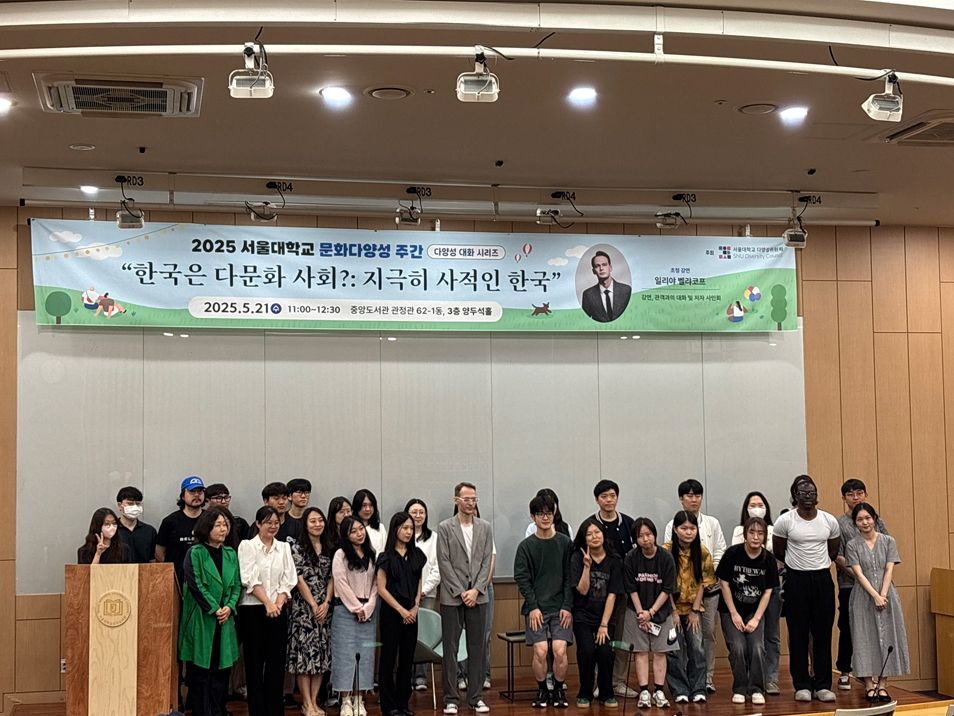From May 19 to 23, the “2025 Seoul National University Cultural Diversity Week” was held across campus. Organized by the SNU Diversity Council, Cultural Diversity Week is an annual event held in mid-May to commemorate UNESCO's World Day for Cultural Diversity (May 21). Bae Yookyung, Chief Policy Advisor of the SNU Diversity Council, explained the background of the event: “This is the seventh time we’ve hosted the diversity book and film exhibition. For our second Cultural Diversity Week of the year, we aimed to make the value of diversity more tangible by connecting the film screening, talk series, music program ‘DIVE IN,’ and corporate field trips.”
The highlight of the week was the “Diversity Talk Series,” held on May 21 at Yang Doo-suk Hall in the SNU Central Library. This interactive lecture program promotes understanding and empathy through conversations with speakers from diverse cultural backgrounds. The invited speaker was Professor Ilya Belyakov from the University of Suwon. “We considered speakers on the theme of multicultural or multiethnic societies. Professor Belyakov is someone who not only introduces Russian culture but also became a naturalized citizen in Korea, thus embodying a dual identity. He offers the perspective of someone crossing boundaries through his media appearances,” said Bae Yookyung, who organized the event.
In the opening remarks, Min Eungi, Chair of the Diversity Committee, stated, “Professor Belyakov has been sharing a boundary-crossing perspective while living in Korea and promoting Russian culture. We’re grateful for the opportunity to have this sincere conversation.” Professor Belyakov’s lecture, titled A Very Personal Korea, offered deep insights into multiculturalism and coexistence beyond conventional notions.

(left) Moderator Jang Eunjae (Ph.D. student in Russian Language and Literature) of the Diversity Talk Series / (right)Opening remarks by Min Eungi, Chair of the SNU Diversity Council
Is Korea a Multicultural Society?
“Is Korea a multicultural society?” This was the question that opened Professor Belyakov’s lecture. “Even now, I still put a question mark at the end of that question,” he said. While “multiculturalism” is a common term in sociology, he noted that in everyday life, it often creates a divide between “us” and “them,” which may deepen feelings of alienation. “The word ‘multicultural’ implies a division: ‘We are the people who live here, and you are the ones who came from outside.’ That’s why I try to avoid using that term,” he explained. Rather than multiculturalism, Professor Belyakov emphasized the coexistence of identities. His lecture went beyond personal anecdotes of a naturalized citizen and explored how the global era of migration is unfolding in Korea and around the world. Citing UN statistics, he noted that Korea ranked 16th globally for the number of immigrants received in 2023. “Korea is now officially recognized as the first multiracial nation in Asia. By 2050, it’s projected that more than 10% of the population will be of foreign origin. This is not an issue, but a reality and an opportunity we must embrace.

(left) Professor Ilya Belyakov giving his lecture / (right) Audience listening attentively
Korea’s Deeply Rooted National Identity
Professor Belyakov also addressed the reality faced by immigrants in Korea. He pointed out the differences in policies based on immigrant status—naturalized citizens, permanent residents, international students, migrant workers, and marriage immigrants. “For example, Southeast Asian women who marry Koreans may receive permanent residency or naturalization, but temporary workers cannot naturalize no matter how long they stay. Even though they are all considered foreigners, some are objectified or treated differently,” he argued. “There is an abundance of media reports claiming immigrants increase crime rates or threaten public safety, but very few stories highlight their contributions to society,” he said, criticizing how Korean media and political discourse often frame immigrants through a lens of otherness. He cited examples of influential immigrants like Elon Musk, Albert Einstein, and Google co-founder Sergey Brin to challenge the perception that immigration inherently poses risks.
He analyzed that these issues stem from education, media, and political narratives. “The old narrative of ethnic homogeneity is disconnected from the multicultural structure of contemporary society. The media often incites hate speech,” said Professor Belyakov. “I believe education holds the answer. It’s crucial to avoid building walls and instead focus on shared values and relationships over language or appearance.”

Speaker Prof. Ilya Belyakov and moderator Jang Eunjae during the Q&A session
In the Q&A session, many questions focused on the notion of “Korean identity.” Professor Belyakov responded, “Legally, I am a citizen of the Republic of Korea, but in terms of ethnicity and language, I’m not Korean.” He noted that the Russian language distinguishes between ethnic Russians and citizens of the Russian Federation, whereas Korean lacks such a nuanced distinction between ethnicity and nationality.

Audience members and speaker of the Diversity Dialogue Series posing for a commemorative photo
Professor Belyakov’s lecture raised sharp questions about Korea’s transition into a multicultural society. He emphasized the need for not only legal and institutional changes but also shifts in perception, language, and social practice when asking, “How do we coexist with the ‘other’ among us?”
The 2025 Seoul National University Cultural Diversity Week, hosted by the SNU Diversity Council, aimed to spark collective reflection and action in response to such questions. “Diversity is no longer an external value—it must become our internal landscape,” said Chief Policy Advisor Bae Yookyung. With events such as the Diversity Talk Series, the four-day music festival DIVE IN on the SNU Grass Square (featuring fusion Korean traditional music, gypsy music, performances by visually impaired artists, and Latin jazz), and a corporate visit to Kakao’s diversity team, the week served to raise awareness and provoke deeper reflection on diversity and coexistence. It is hoped that the university community will continue to develop a new language to discuss differences and move beyond mere tolerance of diversity toward deeper understanding and growth.
Written by Woo Hyunji, SNU Student Reporter, miah01@snu.ac.kr
Translated by Lim Haeyun, Department of English Language Education

